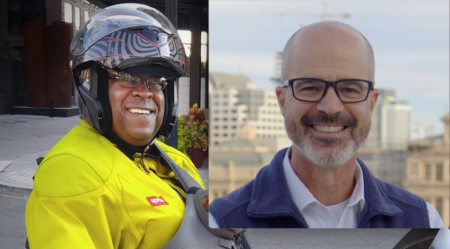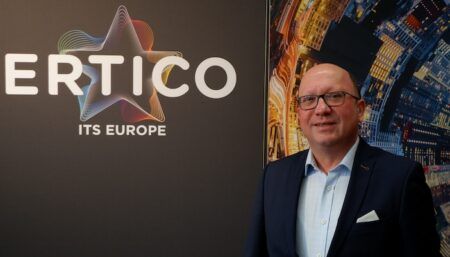A major French civil engineering group is set to start trialing its innovative solar road system, and is in the process of identifying potential UK sites with clients interested in the world’s first ever photovoltaic road surfacing technology.
The innovative ‘Wattway’ technology from Colas provides clean, renewable energy in the form of electricity, while allowing for all types of road traffic. Installed on top of an existing road surface, the solar panels are extremely lightweight and strong. Designed and tested to endure vehicles continuously passing over the surface, the panels are only 7mm (0.275in) thick and are applied to the surface using a high performance resin. A glass bead resin coating is also applied to allow the surface to provide acceptable frictional performance, without significantly affecting the solar panels efficiency.
The power generated by Wattway has the potential to be used for highways and transportation infrastructure, such as variable message signs (VMS) and streetlights, but could also be returned to the grid or used to supply energy to nearby homes and businesses. An innovative source of renewable energy, it is particularly well suited to smart grids and short-circuit electricity production, as the need for new sources of energy and electric mobility continues to rise.
Each solar panel comprises an array of 6in-wide cells (15cm) that make up a very thin film of polycrystalline silicon that transforms solar energy into electricity. These extremely fragile photovoltaic cells are coated in a multilayer substrate composed of resins and polymers, translucent enough to allow sunlight to pass through, and resistant enough to withstand even large vehicle traffic.
The composite perfectly watertight ‘sandwich’ is also designed to adapt to the pavement’s natural thermal expansion. The surface that is in contact with vehicle tires is treated to ensure skid-resistance equivalent to conventional asphalt mixes. Electrical connections can be installed at the edge of the carriageway or in ducts integrated in the panels themselves. Electronic circuit breakers ensure safety. During the trial, data will be gathered on Wattway’s functionality in parallel with the site requirements, as well as on how efficiently it generates energy.
“Without doubt this is an extremely exciting time for the industry, and we are looking for a number of forward-thinking clients who are interested in running Wattway trials with us,” explained Carl Fergusson, executive director of strategy and development at Colas.
“The UK trials will form part of about 100 trials taking place across the world. The first trial has already begun in France and by producing renewable energy, Wattway will certainly play a major role in building smart, sustainable roads of the future. The trial sites will allow us to experiment with different ways to use this innovative technology and the feedback will help us validate the most appropriate solutions for our market. Reviewing feedback from our UK trial sites will allow us to validate the most appropriate solutions for the UK market, which will ultimately help build our offers for full scale launch as of 2018.”




